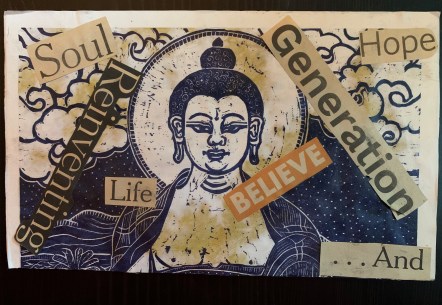What kind of ancestor do you want to become?
To ponder such a question invites us to explore the realm of legacy, Gero-Punk style.
+++

+++
Legacy can transcend the bounds of time-place-space.
Legacy goes in all directions, is deeply, fundamentally relational, and encompasses much more than mere material resources.
By “all directions,” I mean that legacy is trans- and inter-generational and not exclusively about transmission of something important to younger generations from older generations. Legacy can be transmitted in the other direction, as well, and in all directions at once.
By “fundamentally relational,” I mean that the creation of legacy happens in the context of cultivated, on-going relationships (And between both the “living” and the “no-longer-living”; that is, a member of a legacy-creating relationship may no longer be alive but still very present and influential to others, such as the role my Gramma continues to play in my life).
Legacy is an expression of deep, consequential and reverberating connections between humans (and other creatures as well).
A larger-mind view of legacy is that it is about intentionally creating the causes and conditions necessary for a vital present and future life for not only our family members and friends and other closest-in people, but for all living creatures. As such, members of multiple generations traveling through the life course simultaneously join together to pass-around (rather than pass-down) resources. These resources certainly may be material in the traditional sense of legacy – money, property, possessions – but are, importantly and primarily, ethical, intellectual, spiritual and emotional.
Legacy may entail carrying on the traditions and practices of another person who is no longer living (or perhaps whom we never met in person but through the stories told about them), such as by adopting — embodying and enacting – their quintessential characteristics or commitments: a particular habit-of-speech, a jaunty hat they always wore, or their singular role in a larger system. In this way, the special person continues to exist but in a different form, and we are forever changed – and changing — because of our relationship with them.
Lastly, a larger trans-personal view of legacy encompasses non-human creatures, the planet, and our universe, as well as future humans whom we’ll not know because we will no longer be living, but for whom we care nonetheless (and who may someday in the future learn and care about us, their ancestors, as well.).
+++
What kind of ancestor do you want to become?
Why not start practicing now?


Jenny – Thank you for this. Touched my heart and soul. I want my legacy to be, as you said . . .”an expression of deep, consequential and reverberating connections between humans (and other creatures as well).”
Thank you for your lovely response and for reading me!
What an amazing question…ancestor to me always implies such a long reach into the past that it is hard for me to imagine even being an ancestor! Legacy seems a more manageable word for what I would like to leave behind. I also think of how very hard it is to really know all of the people that we touch without knowing it and that those ripples in the pond of our life are parts of our legacy that we will never be able to appreciate. i think of the legacy of Dr. Roger O. Doyle, who gave me my first professional musical gig here in Portland–the number of musicians he trained and shoved out into the world to carry on his legacy of kindness, process, good humor and excellence. I wonder if he knew the kind of love he instilled in his students and the young professionals he nurtured. There’s a legacy!
Thank you, Alexis, for such a thoughtful response. Thanks for reading!
–jenny
Deep questions to ponder! I never considered that someday I will be someone’s ancestor. I want to be remembered as someone that cared about life. I want to share family traditions that will endure generations. I want to be the ancestor that was the example. And now, that being said,I’ve got a lot of work to do to get there!!
Thank you for such thought provoking words. I’ve missed your posts.
I’ve missed my posts, too. 😉 Haven’t had very much head-space since before March…but I feel space returning. Thank you for reading and for your thoughtful comments! I miss ya, Helen!
Hi Jenny, thank you for this. More relevant with each passing day. I regret not seeing this before updating my book. This would have been a spectacular addition in the scope of planning. Thank you for all you do! MJ